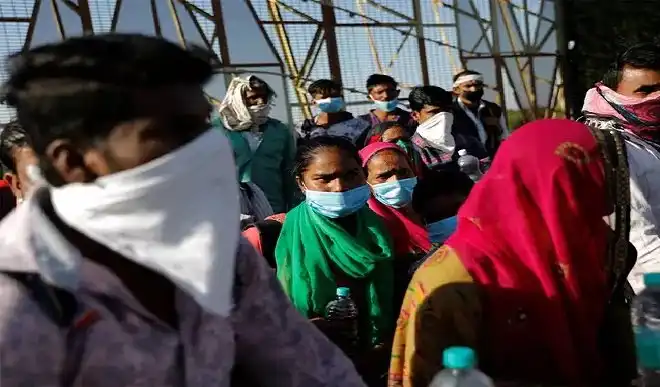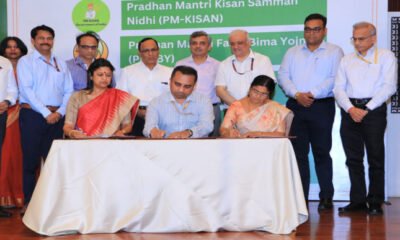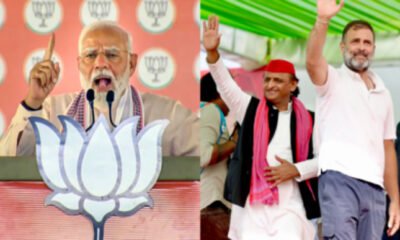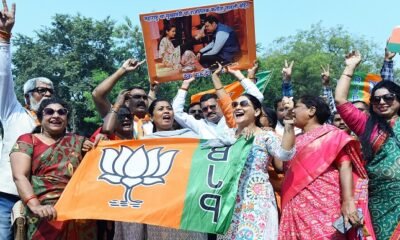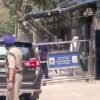National
The Plight of Migrant Workers Amid the Nationwide Lockdown
Khushi Agarwal
In the last few days, a large number of migrant workers have left for their native places, after the announcement of the nationwide lockdown on March 24 left them jobless and consequently homeless as well as incapable of feeding their families. According to government estimates around 300,000 took to roads on foot because of the lack of availability of motor transport. Congress leader Rahul Gandhi while urging the Prime Minister to take immediate steps to provide relief for thousands of migrant workers had said that, “The consequences of a complete economic shut down will disastrously amplify the death toll arising from the Covid-19 virus”. Desparate efforts to return home on foot have already killed 17 migrant workers and 5 children.
Saurabh Dixit (34) a migrant worker died on March 28 after walking from Delhi to Agra, the long walk triggering an existing heart condition. On March 29, 2 migrant workers and 2 children died while walking home in the Bilaspur area of Haryana in a road accident that left 4 others injured. On March 27, 5 migrant workers and 3 children were killed in another road accident in Telangana, while returning to their homes in the Raichur district of Karnataka. In similar cases of road accidents, 4 migrant workers were killed at Virar on the Mumbai-Gujarat highway on 28 March and another migrant worker was killed in Pakwarha area of Moradaba on 29 March. 4 people- including a one year old baby died in a forest fire while taking the forest path home in Tamil Nadu on March 24.
Fight against Coronavirus – problems within
Another concern raised by migrant workers leaving for villages in crowded and unsanitary conditions, is the risk of Coronavirus disease spreading to rural India. To prevent the spread of the virus, the government directed borders to be sealed and opened only for goods movements, on 29 March after a meeting chaired by Cabinet Secretary Rajiv Gauba . State Governments have been ordered to place the workers reaching their borders in state-run quarantine facilities for 14 days to ensure that they do not take the coronavirus disease home. The Centre has also made it mandatory for those running commercial establishments, factories and shops to pay wages during the lockdown. Landlords of properties where migrants are staying were directed not demand payment of rent for a period of one month. Any landlord forcing labourers to pay rent, according to the order, will be liable for action that can lead to a maximum six-month prison sentence or a suitable fine under Section 188 of the IPC.
IMPACT OF COVID-19 ON THE WORLD ECONOMY
Despite these measures, and repeated assurances from different state governments, we cannot be sure that the hardship and mistreatment of migrant workers is over. On 31 March, medical and fire department officials sprayed a group of migrant workers with disinfectant in Bareilly, Uttar Pradesh. Migrant workers at a labour camp in Ernakulam, Kerala organized a sit in protest on 30 March over the shortage of food at the camp. The protest has now entered its second day. On 29th March, hundreds of migrant workers gathered on the streets at Paippad panchayat in Kottayam, Kerala violating the nationwide lockdown seeking to return to their home state. Eyewitness accounts suggest that the workers protested when they found all the local grocery stores closed and the Panchayat refused to intervene. A local resident told The New Indian Express that a mojority of the workers had been starving since the previous day and the denial of food caused the protest.
The Supreme Court has heard two separate PILs which sought relief for migrant workers during the lockdown. On 31 March, the Supreme Court directed the government to ensure that all those whose migration you have stopped are taken care of in terms of food, shelter, nourishment and medical aid. The government was also asked to ensure that trained counsellors and community leaders of all faiths visit relief camps and prevent panic.


